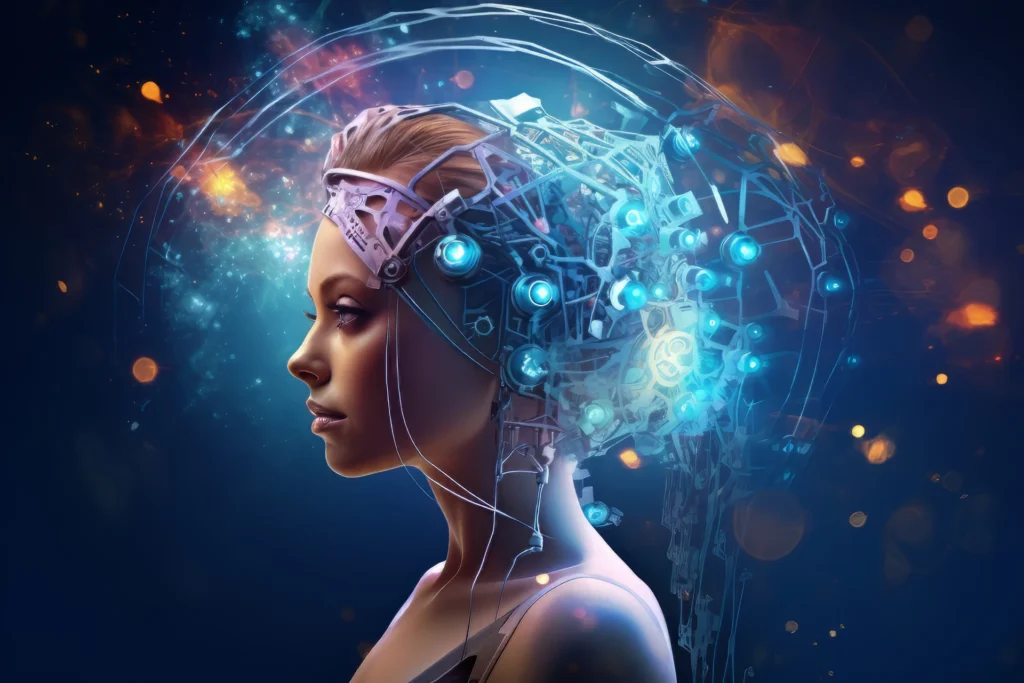Welcome to the future of recruitment—a world where Artificial Intelligence (AI) is not just a buzzword but a practical tool reshaping the hiring landscape. AI interviews are at the forefront of this transformation, offering a novel approach to evaluating candidates.
Artificial Intelligence (AI) interviews are revolutionizing the field of modern recruitment. As companies seek more efficient and unbiased ways to evaluate candidates, AI-powered interviews are becoming increasingly popular. In this blog post, we will explore the rise of AI interviews and their impact on the recruitment process.
This blog post explores the intricacies of AI interviews, their functionality, and their growing impact on the job market. As we navigate through the various facets of AI interviews, we’ll uncover what they mean for recruitment managers and job seekers alike, and how they’re setting the stage for a more efficient and equitable hiring process.

AI Interviews: What They Are and How They Work
Artificial Intelligence (AI) interviews are revolutionizing the field of modern recruitment. As companies seek more efficient and unbiased ways to evaluate candidates, AI-powered interviews are becoming increasingly popular. In this blog post, we will explore the rise of AI interviews and their impact on the recruitment process.
In the rapidly evolving world of recruitment, Artificial Intelligence (AI) is revolutionizing the way companies hire talent. AI interviews, a cutting-edge approach to candidate assessment, are becoming increasingly popular among organizations seeking efficiency and objectivity in their hiring processes.
Let’s delve into what AI interviews are and how they work.
Understanding AI Interviews
AI interviews are structured interactions between a candidate and an AI system designed to evaluate various aspects of the applicant’s suitability for a role. These interviews use algorithms and machine learning to analyze responses, speech patterns, and even non-verbal cues to assess a candidate’s fit.
Types of AI Interviews
- Asynchronous Video Interviews: Candidates record answers to pre-set questions, and AI analyzes their responses.
- Synchronous AI Interviews: Real-time interviews where AI interacts with candidates, asking questions and evaluating answers on the spot.
- Chatbot Interviews: Conversational AI conducts text-based interviews, simulating a natural conversation flow.
How AI Interviews Work
- Question Design: AI interviews begin with carefully crafted questions that align with the job’s requirements.
- Candidate Interaction: Candidates engage with the AI through video, audio, or text, providing their responses.
- Data Analysis: AI systems analyze the content and delivery of responses, including language complexity, sentiment, and confidence.
- Competency Assessment: The AI evaluates the candidate’s answers against a set of competencies or skills required for the job.
- Report Generation: A detailed report is generated, highlighting the candidate’s strengths and areas for improvement.
Benefits of AI Interviews
- Efficiency: AI interviews can screen large volumes of applicants quickly.
- Consistency: Every candidate is asked the same questions in the same way, ensuring fairness.
- Data-Driven Insights: AI provides objective data that can support better hiring decisions.
- Accessibility: Candidates can complete interviews at their convenience, removing scheduling barriers.
Challenges and Considerations
While AI interviews offer numerous advantages, there are challenges to consider:
- Bias Mitigation: AI systems must be carefully trained to avoid inherent biases.
- Human Touch: AI cannot fully replace the nuanced judgment of human recruiters.
- Candidate Experience: Organizations must ensure that AI interviews are user-friendly and do not deter potential applicants.

Future of AI Interviews
As technology advances, AI interviews will become more sophisticated, offering deeper insights and a more seamless experience. However, the human element will remain crucial in interpreting AI-generated data and making the final hiring decisions.
AI interviews are not just a trend; they are a glimpse into the future of recruitment. By embracing this technology, companies can enhance their hiring processes, making them more efficient, equitable, and effective.
AI interviews are a testament to the transformative power of technology in the workplace. As we continue to explore the potential of AI in recruitment, it’s clear that the human-AI partnership will shape the future of hiring for years to come.
Integrating AI Interviews into the Recruitment Process
The integration of AI interviews into the recruitment process requires strategic planning and execution. Here’s how organizations can seamlessly incorporate AI interviews:
- Pilot Testing: Begin with a pilot program to test AI interviews for specific roles or departments.
- Training Recruiters: Equip human resource teams with the necessary training to use AI interview platforms effectively.
- Candidate Preparation: Provide candidates with guidelines and resources to prepare for AI interviews, ensuring they understand the process.
- Feedback Loop: Establish a feedback system where candidates can share their experience, and recruiters can refine the AI interview process accordingly.
By taking these steps, companies can ensure that AI interviews complement their existing recruitment strategies, enhancing the overall efficiency and effectiveness of the hiring process.
Ethical Considerations in AI Interviews
Ethical considerations are paramount when implementing AI interviews. Organizations must address the following:
- Transparency: Be clear with candidates about the use of AI in the interview process and how their data will be used.
- Consent: Obtain explicit consent from candidates before using AI to evaluate their interviews.
- Privacy: Ensure robust data protection measures are in place to safeguard candidate information.
- Accountability: Maintain human oversight to review AI decisions and address any discrepancies or concerns.
By prioritizing ethical considerations, companies can foster trust and maintain the integrity of their recruitment processes while leveraging the benefits of AI technology.
We aim to provide a comprehensive understanding of AI interviews, emphasizing the importance of thoughtful implementation and ethical practices. As AI continues to transform the recruitment landscape, it’s crucial for organizations to navigate these changes responsibly and effectively.
Tips for Recruitment Managers
As recruitment managers, navigating the AI interview landscape can be challenging. Here are some tips to effectively manage AI interviews:
- Stay Informed: Keep abreast of the latest AI technologies and trends in recruitment to make informed decisions.
- Set Clear Objectives: Define what you aim to achieve with AI interviews, whether it’s reducing time-to-hire, improving candidate quality, or enhancing diversity.
- Customize AI Settings: Tailor the AI’s parameters to match the specific competencies and qualities you’re looking for in candidates.
- Monitor AI Performance: Regularly evaluate the AI’s effectiveness and make adjustments as needed to ensure it aligns with your recruitment goals.
- Foster Collaboration: Work closely with IT and data science teams to ensure the AI system is integrated smoothly into your recruitment process.
By following these tips, recruitment managers can leverage AI interviews to their full potential, making the hiring process more strategic and data-driven.
Tips for Job Seekers
For job seekers, AI interviews can seem daunting. Here are some tips to help you prepare and succeed:
- Research the Company: Understand the company’s culture and the role you’re applying for to tailor your responses.
- Practice Common Questions: Familiarize yourself with typical interview questions and practice articulating clear, concise answers.
- Test Your Technology: Ensure your camera, microphone, and internet connection are working properly to avoid technical issues during the interview.
- Be Natural: Treat the AI interview as you would a human interview—be professional, but don’t be afraid to show your personality.
- Seek Feedback: After the interview, ask for feedback on your performance, which can provide valuable insights for future interviews.
With these tips, job seekers can approach AI interviews with confidence, showcasing their best selves to potential employers.
We aim to provide practical advice for both sides of the recruitment process, ensuring that AI interviews are a positive experience for all involved and lead to successful hiring outcomes.
Top 10 AI Interview Tools
The market is brimming with AI interview tools, each offering unique features to streamline the recruitment process. Here are the top 10 AI interview tools that are transforming the hiring landscape:
- Interview Copilot: Offers real-time AI guidance during interviews, crafting polished responses tailored for live interactions.
- Huru: An AI-powered interview coach that provides personalized sessions and instant feedback from a pool of over 20,000 questions.
- Wizco’s Ava: Utilizes data from 10,000 companies to provide tailored question sets and communication tone analysis.
- InterviewIgniter: Uses AI roleplay simulations with immediate feedback, powered by OpenAI’s ChatGPT.
- AI Mock Interview: Tailors interview practice with detailed feedback and insights from the latest AI engine.
- TalkBerry: A language learning app with an AI-powered interview simulation feature to improve English interview skills.
- RightJoin: Offers personalized mock interviews based on uploaded resumes and job postings.
- Interviewsby.ai: Provides tailored practice sessions customized to job descriptions, powered by ChatGPT.
- InterviewAI: Creates personalized cover letters and generates tailored interview questions.
- Interview Prep AI: Addresses job seekers’ frustrations with streamlined CV integration and iterative practice.
These tools are designed to help candidates prepare for interviews and assist recruiters in evaluating applicants more effectively.

Future of AI Interview Tools in Job Recruitment
The future of AI interview tools in job recruitment is promising and expected to bring about significant changes:
- Advanced Candidate Assessment: Upcoming tools will analyze facial expressions, tone of voice, and other non-verbal cues for deeper insights into candidate suitability.
- Bias Elimination: AI interviews will continue to evolve to eliminate unconscious biases, focusing solely on an individual’s qualifications.
- Efficiency and Accessibility: AI-powered chatbots will engage with potential candidates, saving time and resources while providing immediate feedback.
- Data-Driven Recruitment: With the ability to process high volumes of applications swiftly, AI interviews will make hiring decisions more informed and data-driven.
- Diverse Talent Acquisition: AI will play a crucial role in promoting diversity in the workplace by providing equal opportunities for all applicants.
As AI technology advances, we can expect AI interview tools to become more sophisticated, offering a more personalized, efficient, and fair recruitment process for both candidates and employers.
We aim to provide a glimpse into the current state and the exciting future of AI interview tools, highlighting their potential to revolutionize the recruitment industry.
Frequently Asked Questions (FAQs) About AI Interviews
This FAQ section aims to address common queries and concerns about AI interviews, providing clarity and insight into this innovative recruitment tool. Here’s an FAQ section for the blog post on AI Interviews:
What exactly is an AI interview?
A: An AI interview is a type of job interview that utilizes artificial intelligence to evaluate a candidate’s responses. It can be conducted via video, audio, or text and can analyze speech, language, and even non-verbal cues.
How do AI interviews differ from traditional interviews?
A: Unlike traditional interviews, AI interviews use algorithms to assess candidates objectively, without human biases. They can process large volumes of interviews quickly and provide consistent questions and evaluations for all candidates.
Are AI interviews reliable?
A: AI interviews are designed to be reliable by using data-driven analysis. However, they should be used in conjunction with human judgment to ensure a comprehensive evaluation of a candidate.
Can AI interviews help reduce hiring biases?
A: Yes, AI interviews can help reduce biases by providing an objective assessment of candidates based on their responses, rather than subjective factors like appearance or background.
Will AI interviews replace human recruiters?
A: AI interviews are not likely to replace human recruiters entirely. They are tools that assist in the screening process, but human insight and decision-making remain crucial for final hiring decisions.
How should candidates prepare for an AI interview?
A: Candidates should prepare for AI interviews just as they would for a traditional interview—research the company, practice answering questions, and ensure their technology is working properly.
What are some common features of AI interview software?
A: Common features include speech and language analysis, facial expression and emotion recognition, and the ability to generate comprehensive reports on candidate performance.
Is my data safe when I participate in an AI interview?
A: Reputable AI interview platforms should have robust data protection measures in place. Always check the company’s privacy policy and ensure your data is handled securely.
How can companies ensure fairness in AI interviews?
A: Companies can ensure fairness by regularly auditing their AI systems for biases, providing candidates with clear instructions, and maintaining human oversight in the recruitment process.
What is the future of AI interviews?
A: The future of AI interviews is likely to see more advanced analytics, improved candidate experiences, and further integration into the recruitment process, all while ensuring ethical standards are upheld.
What kind of roles are best suited for AI interviews?
A: AI interviews are particularly useful for roles where a large number of applicants are expected. They are also beneficial for positions that require specific technical skills or language proficiency, which can be objectively assessed by AI.
How do AI interviews handle different languages and accents?
A: Advanced AI interview tools are equipped with natural language processing capabilities that can understand and analyze a wide range of languages and accents. However, it’s important for candidates to clarify if a specific language or accent is required for the role.
Can AI interviews assess a candidate’s personality?
A: AI interviews can provide insights into certain personality traits based on the analysis of language and behavior. However, they should not be the sole method of personality assessment, as they may not capture the full complexity of an individual’s character.
Are there any legal concerns with using AI in interviews?
A: Yes, companies must comply with employment laws and regulations regarding non-discrimination and privacy. It’s crucial to ensure that AI interview tools do not inadvertently discriminate against any group of candidates.
How can candidates ensure they are understood by AI during an interview?
A: Candidates should speak clearly and at a moderate pace, directly address the questions asked, and ensure their environment is free from noise and distractions that could interfere with the AI’s ability to analyze their responses.
What happens if there is a technical issue during an AI interview?
A: Most AI interview platforms have protocols for technical issues, such as allowing candidates to re-record answers or providing technical support. Candidates should contact the employer or the platform’s support team if they encounter any problems.
How do AI interviews impact the candidate experience?
A: AI interviews can make the application process more convenient and less intimidating for some candidates. However, others may find it impersonal. Companies should strive to balance AI interviews with personal interactions to maintain a positive candidate experience.
Can AI interviews be customized for different job roles?
A: Yes, AI interview platforms often allow recruiters to customize questions and evaluation criteria to align with the specific requirements of different job roles.
How do companies ensure the AI interview tool they choose is effective?
A: Companies should conduct thorough research, read reviews, request demos, and possibly run pilot tests to ensure the AI interview tool meets their needs and is effective in identifying suitable candidates.
How will AI interviews evolve with advancements in technology?
A: As technology advances, AI interviews are expected to become more sophisticated, with improved analytics, enhanced candidate engagement, and even more robust bias detection and mitigation features.
These FAQs aim to address further inquiries about AI interviews, providing a deeper understanding of this innovative recruitment tool and its implications for the future of hiring.
Read More:
- Top 30 Work-From-Anywhere Jobs: Criteria Salary Professions Future – The Ultimate Guide
- Ex-Amazon HR Reveals Five Ways Candidates Can Answer Difficult Questions in Job Interviews
- Tips for Job Seekers to Avoid These Phrases in Resumes
Conclusion about the Rise of AI Interviews in Modern Recruitment
AI interviews represent a significant leap forward in the recruitment industry, blending the precision of technology with the complexity of human interaction. As we’ve seen, they offer numerous benefits, from streamlining the hiring process to enhancing candidate experience and promoting diversity.
However, they also come with challenges that require careful consideration, particularly regarding ethics and the human touch in recruitment. Looking ahead, the role of AI interviews will only grow, becoming an integral part of how organizations find and attract talent.
It’s an exciting time for both recruitment managers and job seekers, as AI interviews redefine the boundaries of possibility in the job recruitment process.